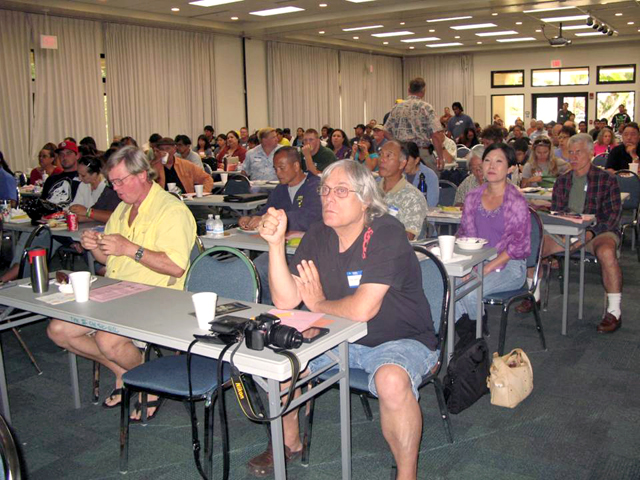On Saturday, I spoke at a workshop on soil-less farming, which was put on by the College of Tropical Agriculture and Human Resources at UH Manoa. The core group was made up of aquaculture enthusiasts, and the workshop expanded into hydroponics (the growing of crops in soil-less media). About 170 people attended.
Fred Lau spoke on the challenges that he has faced while developing his aquaponic operation. Tim Mann and Susan Friend spoke on their Friendly aquaponic operation on the Big Island. They sell modular aquaponic systems with complete, how-to instructions.
Tisha Uyehara spoke about marketing produce. She pointed out the importance of growing what is in demand, and in the quantity and quality that retailers need.
I was asked to speak about Hamakua Springs’ hydroponic tomatoes. I started by asking how many in the audience were new farmers or folks who are interested in farming. Maybe 40 people raised their hands. They looked to be younger folks, in their 20s to 30s. I have noticed that lots of folks are interested in farming; they are just trying to figure out how they can make a living at it. I got the feeling that most of the audience was made up of community folks.
Instead of talking about the technical details of our operation, which they could learn by taking courses or getting information from the internet, I decided to share with them the thought processes that went into developing our farm.
I related how my Pop told us small kids to look for three answers to every problem and then find one more. He also said, “There are a thousand reason why no can; I am only looking for the one reason why Can!”
I told them about being influenced by my experiences in the jungles of Vietnam, where the unwritten rule was that “We all come back or no one comes back.” I liked that attitude of taking care of each other. Although I had flunked out of UH earlier, this time I knew I wanted to go into business and so I decided to major in accounting, in order to keep score.
Then Pop asked me to come and run the family poultry farm. I had no money, but really that was a blessing, because then I could not lose money. Instead, I gained experience. We traded chick manure to get banana keiki, and eventually grew to be the largest banana farm in Hawai‘i.
Along the way, we had to change and adapt constantly, and so change is second nature to us. We just look into the future five to 10 years, and force the changes to get us there. I told the audience that this is the secret to our survival. It isn’t rocket science, but is common sense: Being able to adapt and force change are traits that have served us well over the years.
I could tell from the audience’s reaction that they absolutely got it; that they have the tools, or can get the tools, that are necessary to make a difference.
Six or seven years ago, we realized that input costs to our farm were rising due to the fossil fuel component. I went to the Peak Oil Conference to learn about oil and figure out how we would force change so we could adapt our farm to be relevant in the future.
I learned that the world has been using twice as much oil as it has been finding, and has been doing so for 20 to 30 years. That was clearly not sustainable and we set out to transform our farm. We looked into using the water flowing downstream to generate electricity. Soon we will be completely off the electric grid.
We also downsized our farm, and then made up for the loss of production by leasing land to area farmers. The result is that the productivity of our land has actually increased, and the variety of products has increased as well. Another benefit: It strengthens our community.
I talked about how sun energy gives mainland farmers an edge over Hawai‘i farmers. Long summer days result in high production, and as the production follows the sun around the country, this advantage is kept throughout summer.
But I told the audience that we could get an advantage if we were able to use our natural resources to get cheaper electricity. Quite often folks think that fuel is the highest cost of getting farm-grown food to the table. It is actually the cost of electricity that is more important. Keeping the cold chain from the farm to the home refrigerator is actually more costly than the cost to run the tractors.
When oil is $100 per barrel, which is near today’s price, the cost to make electricity from oil is around 20 cents/kWh. However, the cost to make electricity from geothermal is only about 10 cents/kWh, and it will remain stable.
Lloyds of London warns of $200 per barrel oil by 2013. The cost to generate electricity from that oil will rise to 40 cents/kWh, while geothermal electricity will stay at 10 cents/kWh.
The answer to food and economic security is to force change.
I was struck by people’s reactions to my talk. The way that people expressed their appreciation for what I said makes me think that people are getting very worried for Hawai‘i’s future. I think that people felt hopeful, that common sense was more important to survival than any amount of letters after one’s title.

